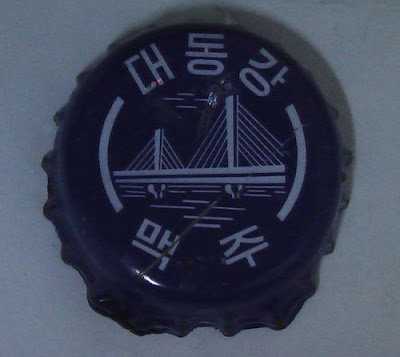The International Sejong Soloists are a conductorless string ensemble founded by Hyo Kang, who named the group after the Korean king most revered for his devotion to culture and the arts. Based in New York, their members come from eight different countries, but there’s definitely a certain Korean flavor about the whole organization, and they receive a lot of support and attention from the Korean community.
On Sunday night, I had the privilege of volunteering at their eighth annual benefit concert, held at Zankel Hall, Carnegie’s jewelbox space for recitals. My role consisted mostly in helping to welcome the guests in various ways: guiding them to the coat check at the reception, pointing them to their tables for dinner, handing out gift bags afterwards, answering questions at the silent auction.
I was a little worried about bumping into my boss while serving as a valet — Ambassador Kim was scheduled to attend, though I believe he never arrived, and though the evening’s honoree, Ban Ki-moon, was not in attendance (he was in Bali, helping to nail down the climate treaty), I thought I might bump into Mr. Yoon Yeo-cheol, his personal secretary and a former Counsellor at the Korean Mission. I didn’t see either of them, but I did get chatted up extensively by an older woman who claimed to be a “UN correspondent” and wanted to know about the new ambassador’s personality. I said little.
Probably the most interesting part of the whole experience (besides the music) was getting to wander around in the interior of Carnegie Hall. I’ve still never been in the main hall, but I’ve now been in a couple of the reception spaces, and also in the maze that constitutes Carnegie’s vast backstage. There are hallways and more hallways, about as glamorous as government archives and similarly appointed with cheap linoleum and fluorescent lighting. The elevators have elaborate notes next to each button to help you figure out which hall’s mezzanine or whatever you’re about to land behind.
When it came time to move from the dinner space to the concert, I ended up lost with a young Korean volunteer and the event coordinator, and it felt very “Hello Cleveland” to be doubling back and asking security how to get to the hall. We finally found ourselves standing before a door that said “Mezzanine,” and below that, “THIS DOOR MUST REMAIN CLOSED AT ALL TIMES.” After a bit of hesitation — we were desperately trying to avoid walking out on stage by accident — I decided to take the plunge, and fortunately we wound up exactly where we were supposed to be.
The music is what drew me to volunteer — I had seen Sejong once before and been deeply impressed with their passionate intensity — and on Sunday they did not disappoint. After a bit of speechifying, hosted by TV journalist Paula Zahn, a longtime friend of the ensemble, the performance began on a conservative note, with Haydn’s Notturno in F major. It’s the kind of piece that too many ensembles are willing to sleepwalk through, but Sejong dug in with admirable vigor. Two Bach cantatas, “Liebster Jesu, mein Verlangen” and “Weichet nur betrübte Schatten,” bounced along nicely on Yousun Chung’s jaunty oboe, though I would have appreciated less anachronistic warble from soprano Hyunah Yu.
Yu’s performance was altogether more extraordinary on Gordon Shi-wen Chin’s outstanding Haiku for Voice and Strings, a work that alternated between churning, engine-like rumbles and cascades of sliding notes that fell like tears. The vocals were less sung than cried out in a plaintive, repeating wail, as Yu recited three haikus, the first and third by Basho, and the second by Buson:
Oh Summer grasses
all that remains
of the warriors’ dreams
I go
and you stay
two autumns
Turn this way
I too feel lonely
late in autumn
The performance was literally breathtaking, and I was literally moved to tears.
After the intermission, the Soloists came back with a couple more warhorses, but really good ones: Bach’s Brandenburg Concerto No. 6, a blast of a technical showpiece, and then Dvořák’s Waltz, Op. 54, No. 1, an utterly lovely Romantic confection.
And then there was Zahn. Paula Zahn fancies herself a cellist, and she would not be embarrassing as, say, a quirky addition to a rock band for a couple of numbers. With the Sejong Soloists, however, her shortcomings were painfully obvious, and it was all too clear that she was on that stage not because she has musical talent, but because she is a rich and influential woman whose vanity is worth appeasing. She and the Soloists performed an original work commissioned from Eric Ewazen, a schmaltzy and easy-to-play set of romantic clichés titled A Poem of Hope. I was reminded of a story I was once told, possibly apocryphal, by a composer and arranger who claimed that there had once been an annual tradition in which a particular wealthy madame rented out Carnegie Hall in order to sing, and that this was a major event on the social calendar, where the challenge was to get through the whole performance without bursting out laughing.
Fortunately the Soloists had one further trick up their collective sleeve: for Edward Elgar’s Introduction and Allegro, Op. 47, they were joined by the Jilliard String Quartet, whose poise and feeling were a fine counterbalance to Sejong’s fire.
I left that night with a gift bag and a smile, having met some fascinating new people, supported a worthy organization, and been touched by an extraordinary ensemble.
 The Korea Society is presenting three nights of happy workers: Films from the North will be shown on May 12 through 14.
The Korea Society is presenting three nights of happy workers: Films from the North will be shown on May 12 through 14.


 Today is my second day without caffeine. Yesterday I also …
Today is my second day without caffeine. Yesterday I also …  Somehow I missed
Somehow I missed 